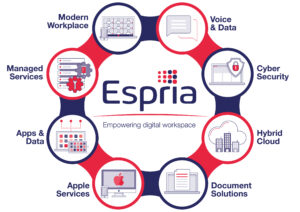Sophos’ 2024 Threat Report recently highlighted ransomware as the biggest existential cyber threat to small businesses. While cyberattacks on large companies and government agencies may receive more news coverage, Sophos reported that SMB’s are generally more vulnerable to cybercriminals and suffer more proportionally from the results of a breach.
Cyberattack recovery costs can be detrimental to businesses still establishing themselves, even forcing some of them to close. Veeam previously reported that 85% of ransomware attacks targeted small businesses, most of which did not have an incident response plan that had been tested within the previous six months, thus forcing them to pay ransoms to regain data. The high cost of recovering data and salvaging reputations means up to 60% of small businesses fail after a successful cyberattack.
Dave Adamson, CTO at Espria believes the relationship between cybersecurity and business success is more critical than ever before, and the inability to safeguard customer data from threats can have a negative impact on finances as well as a brand trustworthiness.
“Trust forms the foundation of any business-customer relationship. Customers need to feel confident their data is secure; however, cybersecurity risks are becoming more systematic and severe. The inability to protect customer data from cyberattacks or breaches can dismantle this trust. Although the short-term impacts of a cyberattack, such as financial costs, are quite severe, the long-term knock-on effects on brand reputation can be more harmful and potentially lead to a loss of business revenue.”
“Earning and retaining customer trust can be effortlessly hindered if IT leaders are not sufficiently prepared for a cybersecurity attack. Many smaller businesses forgo a ransomware response plan or affordable backup plan as it may not appear operationally worth the investment, but when compared with how a data breach can entirely damage their business reputation, it has become a necessity to combat modern cybercriminal activity.
The Department for Science, Innovation and Technology estimates that around 22% (312,000) of UK businesses were hit with a cyberattack last year, primarily via phishing leads. Larger businesses were the biggest victims of cybercrime attempts and were also found to be the primary targets of other types of attacks, such as unauthorised access attempts, malware and ransomware. But often, it’s SMBs that suffer greater consequences.
“Unlike larger enterprises, small businesses often lack extensive security resources, making them particularly vulnerable to crippling attacks. These usually run with a focus on rapid growth and success, leaving security behind for the promise of profit. However, in today’s data security environment and ease of access, cybersecurity must be addressed and updated weekly.
“Some SMEs also mistakenly believe they’re too small to be a target and don’t prepare against cyber threats. These incidents can cripple business operations and perpetuate a bad reputation that sticks in customers’ minds. While large businesses might be able to absorb the loss of customers and costs caused by a cyberattack, limited resources mean that recovering from setbacks can be more extensive and complicated.
“Implementing comprehensive and proactive security measures is necessary to ensure that one attack doesn’t eliminate their operations and customer trust. By proactively protecting your business, IT leaders can confidently demonstrate their commitment to safeguarding data and build a reputation as a trustworthy and reliable organisation.”
“Investing in IT support partners can allow businesses to educate staff about the best cyber practices and provide awareness training to build an impenetrable human firewall. Partners are the most cost-effective way for SMEs to have high-quality talent available on a budget, but for business leaders, ensuring that a backup plan is in place can be the difference between surviving an attack or being crippled indefinitely.”

